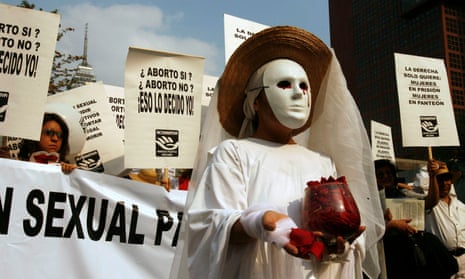The day that Dafne McPherson’s life came apart began like any other: she dropped her seven-year-old daughter Lia at school, then started her shift in the children’s clothing section of the Liverpool department store in the central Mexican city of San Juan del Río.
At around 5pm, she felt a sharp abdominal cramp and spoke to the store nurse, who told her nothing was amiss. But shortly afterwards, in the second-floor bathroom, McPherson went into labour. She says she hadn’t even realised that she was pregnant.
McPherson is currently serving a 16-year sentence after she was convicted of homicide for the death of her baby in what she says was a miscarriage.
Her case gained national notoriety when court videos surfaced in which the prosecutor described McPherson’s alleged actions as something “not even a dog would do”.
But activists say the trial demonstrates a growing trend in which Mexican prosecutors in conservative parts of Mexico criminalise women who have miscarriages or complicated childbirths by accusing them of intentionally inducing abortion – which remains illegal in much of the country.
“When they started investigatng Dafne, it was as an abortion investigation, not a homicide case,” said Karla Michel Salas, a human rights lawyer familiar with McPherson’s case.
The persecution of women who have miscarriages started after Mexico City decriminalised abortion a decade ago. In response, other states introduced further restrictions on women’s reproductive rights, Salas said.
Most of the women charged in such cases are poor and unable to find a competent lawyer to defend them, she added.

Officials in Querétaro – a staunchly Catholic state – said the prosecutor would be sanctioned for his disparaging comments about McPherson, but they stood by the case.
A new legal team has filed an appeal for McPherson. But her family fails to understand how their daughter – a single mother – had turned into such a priority for prosecutors.
“Why is there such vindictiveness?” said Edna Veloz, McPherson’s mother. “Who wins in this?”
McPherson’s family and legal team allege that the case was mishandled from the moment she started feel abdominal pains on 17 February 2015.
Paramedics found McPherson unconscious in the bathroom, having suffered a massive loss of blood.
Prosecutors accuse McPherson of murdering her baby by repeatedly flushing the toilet; her lawyer Aureliano Hernández said the baby fell in when she fainted, and the toilets flush automatically.
McPherson was taken to the hospital and released later that night. But state investigators were already building a case against her.
Lawyers for McPherson allege that no real investigation was undertaken. Instead, they say that prosecutors searched for witnesses to confirm a preconceived version of events.
“[The investigation] was all focused Dafne as if she were responsible for everything that happened,” Salas said.
McPherson was detained on 2 September 2015. According to her family, her first lawyer charged a fee but did nothing to build a defence.
A second lawyer was disqualified on the eve of the trial because he had not prepared for Mexico’s newly implemented judicial system, which theoretically provides for the presumption of innocence and oral arguments in court.
A public defender was assigned at the last minute, but called no witnesses and presented no exculpatory evidence, such as a diagnosis from McPherson’s physician that she suffers from hypothyroidism. The condition causes weight to fluctuate and may have explained why she had not realised she was pregnant, her new legal team argues.
The trial lawyer also failed to object to the prosecutor’s comparison of McPherson to a dog and did not challenge the prosecutor’s unsubstantiated claim that she knew she was pregnant and tried to hide her condition, Hernández said.
McPherson was found guilty on 16 July last year. In a final indignity, her family says the public defender told them the sentence was lenient and McPherson would be released early for good behaviour.
Prison hasn’t been easy for McPherson, a shy woman who inherited her surname from an Irish great-grandfather. She hasn’t seen her daughter since she was arrested, because the family followed the advice of a psychologist who recommended that they should not tell Lia that her mother was incarcerated.
“We tell her she’s in the hospital,” said Veloz.
Recently, Lia – now nine – told her grandmother that she had dreamed her mother had returned, Veloz said. “The only thing I can tell her is: she’ll be back with us soon,” she said.
